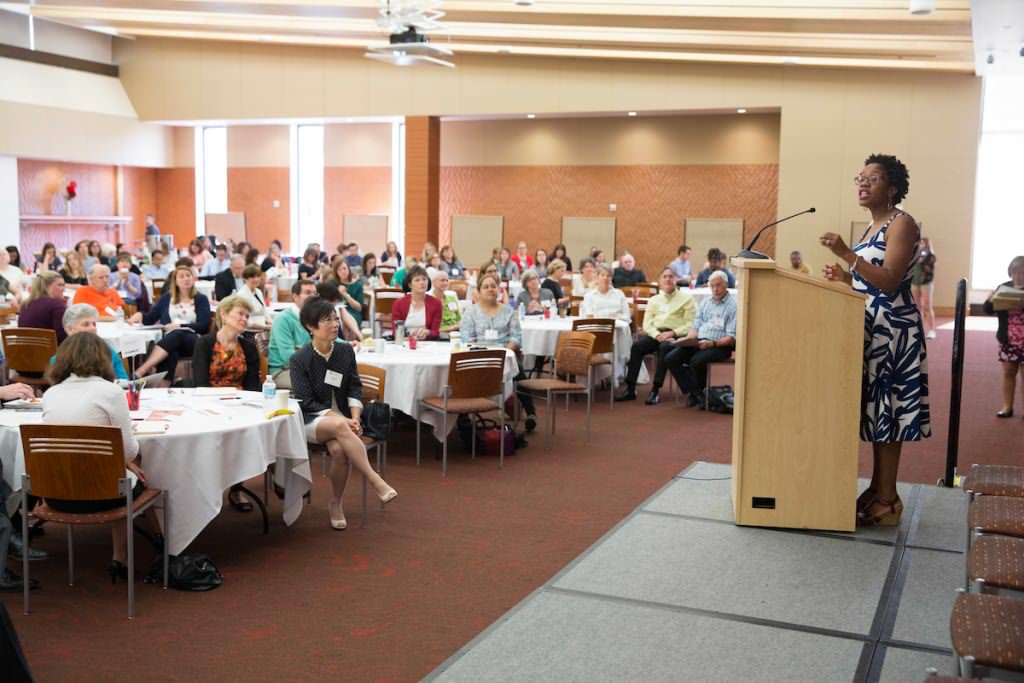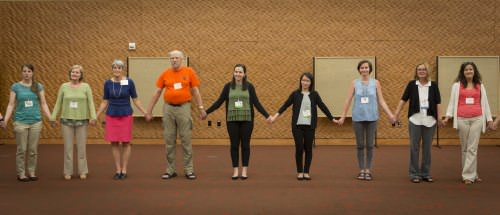First Prenatal-to-Five Summit emphasizes collaboration and starting early to help kids

Janean Dilworth-Bart of the School of Human Ecology addresses attendees at the Prenatal-to-Five Summit on June 2 at Gordon Commons. Andy Manis
More than 300 people gathered June 2 at UW–Madison’s Gordon Commons for Wisconsin’s first statewide Prenatal-to-Five Summit.
Attendees included practitioners, early childhood professionals, scholars and community members of varying backgrounds. The one thing all had in common was a passion for helping children and families in Wisconsin live better lives.
The event — “Elevating the Early Years through Access and Equity” — was hosted by the Center for Child and Family Well-being in the School of Human Ecology, in partnership with several schools and colleges at UW–Madison, UW System administration, and UW-Extension.
“We are excited that people from 51 Wisconsin counties, seven tribal nations and more than 100 agencies were represented at the summit, and we are here to listen to what their needs are,” said Janean Dilworth-Bart, chair of the Summit and the Department of Human Development and Family Studies in the School of Human Ecology. “The focus was to ensure better outcomes and foster long-term well-being for all children in Wisconsin. Research shows great disparities between children who are minorities or who live in poverty, and children who are not in those groups.”

Attendees participate in the Prenatal-to-Five Summit at Gordon Commons. Andy Manis
Key community collaborators include broad range of community-based and statewide organizations such as the Wisconsin Early Childhood Association, Wisconsin Infant Mental Health Alliance, Reach Dane, Birth to Three, and many others.
“As a state, we do have challenges, and we shouldn’t hide that. We should come together,” UW–Madison Provost Sarah Mangelsdorf said. “It is clear to me improving conditions for the next generation and creating better outcomes will require a multidisciplinary and coordinated approach. This summit is a fabulous example of the Wisconsin Idea.”
Dr. Deborah Ehrenthal, who holds the Lifecourse Initiative for Healthy Families Endowed Chair at the UW–Madison School of Medicine and Public Health, talked about how children with African-American mothers are twice as likely to have a low birth weight – something that doesn’t just affect them as infants but also affects readiness to read and school performance, research shows.
“It’s critical we remember racial and income disparities,” Ehrenthal said. “Health care begins before pregnancy.”
Kristen Slack, a professor in the School of Social Work at UW–Madison, talked about the impact of poverty on children’s development, emphasizing how parenting classes, playgroups and respite care can all make huge impacts. It’s not enough to have benefits available, Slack said; families need help navigating the often complicated process to receive those benefits.
“The main takeaway I’d like to leave you with today is the economic support system in all its various components can prevent child maltreatment,” Slack said, pointing out that we need to be particularly careful when changing public policy to think about the potential ramifications.
Joshua Mersky, an associate professor of social work in the Helen Bader School of Social Work at UW-Milwaukee, spoke about why it’s so important to start early with children. His research examines child maltreatment and other adverse experiences that undermine health and well-being.
Providing resources such as home visits and assessments of a family’s strengths and needs can all have major impacts, he said.
“We know that early childhood interventions work,” Mersky said. “We know not only are they effective but they are also cost-effective.”
A primary outcome of the Summit will be establishing an active and diverse network of community members, practitioners, and scholars committed to innovation, multidisciplinary investigation, and collective impact that advances child well-being. Over the summer, a planning group will develop strategic priorities based on the input from the listening sessions.
“As we learn more and more about the impact of early childhood experiences on the future abilities of children and adults, the need for a statewide focus on these issues is apparent,” Chancellor Rebecca Blank said. “This isn’t something that we can lead here in Madison or over in Milwaukee. This is something that will take all of our communities, working together. That means Madison and Milwaukee need to partner with Green Bay, Lancaster, Janesville, and Ashland. To improve the lives of Wisconsin’s infants and children, we need to collaborate.”




